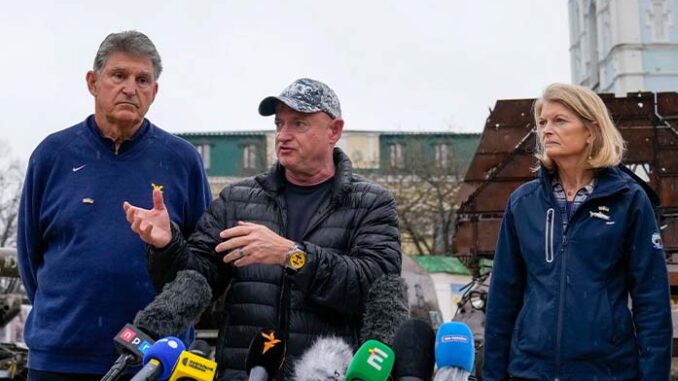
Politicians on the left and right have expressed strong opposition to the continued sending of billions in aid to Ukraine. It might be worthwhile to reflect on events during the mid-twentieth century to better assess the value to the U.S. of aid to Ukraine. Let me preface my comments with the knowledge that all eight of my great grandparents are buried in Ukraine, and the grave of the man whose name I bear, my mother’s maternal grandfather, is in Lviv.
I was born in the midst of World War II, my brother Art was already in the Army. Later that year, he joined thousands of young soldiers in a camp in the South for Advanced Infantry Training (AIT). They were being prepared to invade a semitropical island in the Pacific. Art and a few others with technical training were pulled out of AIT, trained on the P-51 aircraft’s radio equipment, and sent to North Africa. Art served there, in England and in France. He arrived home, in one piece, in early 1946.
My father, who was too old to enlist, volunteered as an air raid warden, patrolling the neighborhood to ensure all shades were pulled down, preventing lights to assist enemy bombers with targeting. What caused my family to be serving? The answer is the Japanese sneak attack on Pearl Harbor and the German declaration of war.
Why did the Axis powers decide they could defeat the U.S.? We must go back to the 1930s for that answer. In 1931, Japan invaded Manchuria, a part of China, and annexed the territory the way Russia has annexed Crimea. The U.S. had no meaningful response to this violation of China’s sovereignty. In 1937, the U.S. Navy gunboat Panay was attacked by Japanese forces, three sailors were killed and 43 were wounded. The ship was severely damaged and was abandoned. Eventually, Japan paid more than two million dollars in reparations but there was no American military response to this act of war.
December 1937, Japan invaded China, its soldiers committed numerous war crimes, raping and killing civilians. This is similar to what the Russians have done during their invasion of Ukraine. The U.S. had no meaningful response to Japanese violations. Meanwhile, in Europe, Adolph Hitler demanded that the Sudetenland part of Czechoslovakia be annexed by Germany since much of the population were ethnic Germans, like Russia’s claim to Eastern Ukraine where many citizens have Russian as their primary language. Military analysist believed that the Czech forces with help from the French, with whom they had an alliance, could have defeated the Germans.
Instead, the British and French caved to Hitler, seeking “peace in our time.” The U.S. did nothing, wanting to avoid involvement in Europe. Japan and Germany saw the Americans as a paper tiger with no interest in challenging their aggression, and with an undermanned military with outdated weapons. Of course, they believed they could defeat the U.S. in their quest to dominate the world.
If the U.S. backs off from its support of Ukraine, Russia will seek new invasions, perhaps a Baltic state or Poland, leading to World War III. The lesson of the 1930s is that not properly responding to a bully will lead to more and stronger bullying. For those who believe that we should focus on our needs, a valuable lesson can be found by examining the actions of Dwight Eisenhower before thin 1952 election. Both parties sought him to be their presidential candidate. It is said that President Truman volunteered to run as Ike’s vice president. The general wanted no part of politics until he realized that the most likely Republican nominee was Robert Taft, an isolationist. Dwight Eisenhower understood the Soviets, knew the dynamics of Europe and believed that a President Taft would remove the U.S. from NATO. This motivated him to run for president. Allowing isolationist tendencies to creep into our presidential politics will lead to disaster.
